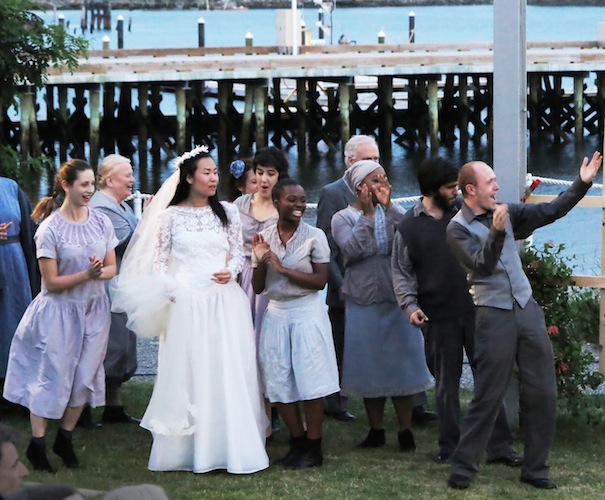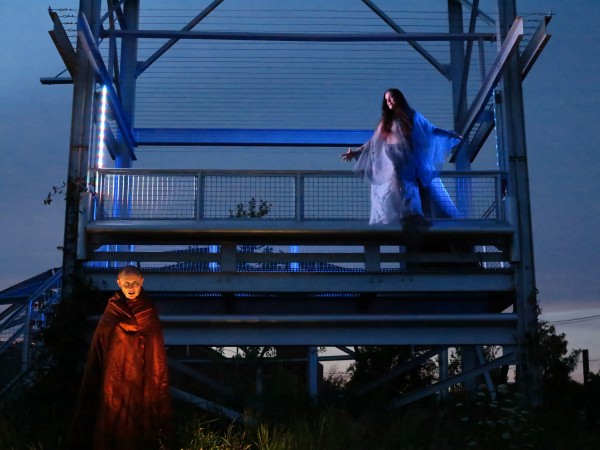Theater Review: Apollinaire’s “Blood Wedding”: A Rural Tragedy on the Chelsea Waterfront
Not only does it speak volumes about 20th century Spanish society that one of its greatest poets and dramatists was persecuted, censored, and murdered, but Blood Wedding remains edgier than most American fare in this century.
Blood Wedding by Frederick García Lorca. Translated by Richard L. O’Connell and James Graham-Luján. Directed by Danielle Fauteux Jacques. Presented by Apollinaire Theatre Company at PORT Park in Chelsea, MA through July 26.
(On Friday nights of the run Apollinaire cedes the stage to Escena Latina Teatro, under the direction of Juan Pedro Panigua for a performance of Bodas de Sangre in the original Spanish. The free production will also be presented in Mozart Park in Jamaica Plain on July 30.)

A scene from Apollinaire Theatre Company’s “Blood Wedding.” Photo: Courtesy of the theater.
By Ian Thal
For Americans, Blood Wedding (Bodas de Sangre) is Federico García Lorca’s best known play. It was first produced in 1933, three years before his assassination by nationalist forces in the early days of the Spanish Civil War: whether the killers were motivated by his politics, his homosexuality, or both is still disputed by his biographers. The play, like his other writings, was officially banned by the Falangist regime of Federico Franco until 1953. Not only does it speak volumes about 20th century Spanish society that one of its greatest poets and dramatists was persecuted, censored, and murdered, but the play remains edgier than most American fare in this century.
Lorca’s imagined rural Spain, though inhabited by fantastic personages, is not the timeless past of fables, but a slowly changing land with a distinctive history. Sons are not just expected to continue a family line, but to somehow turn barren territory into fertile lands; owners, despite their wealth, do not enjoy lives of leisure but work side-by-side with their servants. Marriages do not just join families but the lands they work. Generations of blood and sweat feeding the soil means that families belong to the land as much as the land belongs to them. Families that cannot manage land send their sons to work in factories where they risk injury. These are the serious considerations at play when the families of the bride (Karoline Xu) and groom (David J. Castillo) agree to the betrothal.
The bride’s father (Tony Dangerfield) hopes for many grandsons to transform his wastelands, suitable only for growing hemp, into lush orchards. Meanwhile, the groom’s mother (Mariela Lopez-Ponce) hopes for granddaughters to whom she may teach embroidery and songs. As for young men, their lives are more perilous, often cut short on the end of a knife.
Because it is a world of primal roles, not individuals, Lorca leaves all but one of his characters unnamed: Leonardo (Mauro Canepa), the bride’s former suitor, now married to the bride’s cousin (Anneke Reich). He is a man of hot passions and little compassion, who exhausts the horse he races around the countryside, and shows little concern for his wife, infant son, or mother-in-law (Liz Adams). He harbors an unconsummated lust for the bride he once courted. Not content with what he sees as his diminished place in society, he knowingly turns the pageant into tragedy, fully aware that his actions will mean his death and perhaps the demise of others. The only other names are reserved for characters who are not present: the luckless local boy, Raphael, who lost both arms in the factory’s machines, and Leonardo’s murderous relatives, the Felix clan, who spend their days enjoying drink, gambling, and the camaraderie of their fellow criminals in the local jail after having stabbed the groom’s father and elder brother many years ago.
Despite frequent rains (it was only on my third attempt that I managed to see a performance all the way through) PORT (Publically Organized Recreation Territory) Park is an inspired location for outdoor theater. The park, privately owned by the Eastern Salt company, whose mountains of industrial salt occupy a long stretch of the Chelsea waterfront, was carved out of the docks where oil tanks once stood; their scaffolding, resembling a collection of geodesic domes, now cover a playground, gardens, and an amphitheater of grass and granite. Keep in mind, audience members will have to contend with the occasional recreational speedboater, or evenings when, because of winds, flights from Logan Airport are redirected over Chelsea. But then there are the occasions when the warbling of songbirds provide a welcome accompaniment to the theatrical proceedings.
Director Danielle Fauteux Jacques makes good use of this landscaped space. The Chelsea Creek and East Boston’s docks are the background for folk dancing during the wedding party. There’s a particularly spectacular coup de théâtre during the third act when Jacques has sections of the audience led to different locations within the park as the lovers are pursued through the woods. The audience hears different scenes taking place in the distance – the multi-directionality turns Lorca’s text into a fugue.
As the sun begins to set on the wedding party, Chris Bocchiaro’s lighting design becomes crucial, especially when the performance area expands to include most of PORT Park. His artificial moonlight brings out subtle hues of red, blue, and green, during the chase. Costume designers Jessica Huang and Susan Paino dress the Moon (Liz Adams again) in a diaphanous gauze and their costume for the groom’s mother, a patterned shawl and long black dress, enhance her gravitas as both matriarch and widow.
Composer and music director David Reiffel’s score for this production ranges from simple folk melodies for the characters’ public rites to transforming Lorca’s lyrical poetry into polytonal art songs. Sometimes the more straight ahead tunes are accompanied by hands clapping a syncopated flamenco beat. The five-piece chamber ensemble Reiffel has assembled is stationed behind the audience most of the time, but it occasionally joins the actors (the musicians double in minor supporting roles, sometimes bringing their instruments with them during the wedding festivities).

Liz Adams as the Moon and Brooks Reeves as Death in the Apollinaire Theatre Company’s outdoor staging of “Blood Wedding.” Photo: Courtesy of the theater.
While choreographer Trip Venturella creates some pleasant folk dances for the festivities after the wedding, his most startling accomplishment is during the denouement after the killings: as the girls of the village chant, they weave a web of red wool yard, evoking both schoolyard games and half-remembered pagan rites.
Marla Lopez-Ponce is a commanding presence as the mother of the groom, enraged at the injustices that have been visited upon her proud family, yet restrained by the knowledge that vengeance is not hers to carry out. She remains hopeful for her son’s future. Tony Dangerfield puts in an eccentrically awkward performance as the father of the bride while Ann Carpenter is entertainingly bawdy as a servant in the bride’s home. Called on to embody the elemental forces of the Moon and Death respectively, Liz Adams and Brooks Reeves provide physically stylized performances: Adams’ extended limbs evoke the crescent; Reeves’ takes on a twisted visage as Death, which arrives disguised in the theophany of a beggar woman with gnarled, grasping fingers.
While the cast features a number of fine singing voices, Adams’ brings a lulling distinction to the lullaby she shares with Anneka Reich. The ensemble pieces are also anchored by the resonant baritone of John Scala’s voice.
Boston-area audience members who rely chiefly on public transit (including myself) sometimes have the impression that Chelsea is too far out of the way to see theater. The good news is that this is false: not only is the 111 bus, which makes regular departures from Haymarket, speedy, but Apollinaire’s Blood Wedding is well worth the trip.
Ian Thal is a playwright, performer and theater educator specializing in mime, commedia dell’arte, and puppetry, and has been known to act on Boston area stages from time to time, sometimes with Teatro delle Maschere. His one-act play The Second Annual Administration Building Takeover and the Slumber Party premieres at Boxfest Detroit later this summer. He has performed his one-man show, Arlecchino Am Ravenous, in numerous venues in Massachusetts and Rhode Island. One of his as-of-yet unproduced full-length plays was picketed by a Hamas supporter during a staged reading. He is looking for a home for his latest play, The Conversos of Venice, which is a thematic deconstruction of Shakespeare’s The Merchant of Venice. Formerly the community editor at The Jewish Advocate, he blogs irregularly at the unimaginatively entitled From The Journals of Ian Thal, and writes the “Nothing But Trouble” column for The Clyde Fitch Report.
Tagged: Apollinaire Theatre Company, Blood Wedding, Danielle Fauteux Jacques
